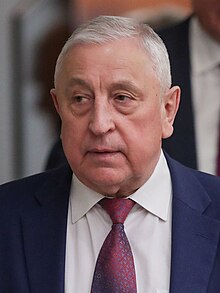Loading AI tools
Russian politician (born 1948) From Wikipedia, the free encyclopedia
Nikolay Mikhailovich Kharitonov[lower-alpha 1] (Russian: Николай Михайлович Харитонов; born 30 October 1948) is a Russian communist politician who has served in the State Duma since 1994, and as Chairman of the Committee on the Development of Far Eastern and Arctic regions since 2011. Kharitonov was the Communist Party of the Russian Federation's candidate for the 2004 Russian presidential election and for the 2024 Russian presidential election, but was defeated in both by the incumbent president Vladimir Putin.
You can help expand this article with text translated from the corresponding article in Russian. (February 2013) Click [show] for important translation instructions.
|
Nikolay Kharitonov | |
|---|---|
| Николай Харитонов | |
 Kharitonov in 2024 | |
| Member of the State Duma | |
| Assumed office 11 January 1994 | |
| Constituency | Novosibirsk Oblast (1994–2007) Party List (2007–2016, 2021–present) Krasnodar Krai (2016–2021) |
| Chairman of the State Duma Committee on the Development of Far Eastern and Arctic regions | |
| Assumed office 21 December 2011 | |
| Preceded by | office established |
| Personal details | |
| Born | 30 October 1948 Rezino, Novosibirsk Oblast, Russian SFSR, Soviet Union |
| Political party |
|
| Spouse |
Nina Kharitonova (m. 1972) |
| Children | 4 daughters |
| Education | |
| Occupation |
|


This article needs to be updated. (March 2024) |
Kharitonov was previously a member of the Agrarian Party until he quit in protest of their cooperation with the ruling United Russia party. He is best known for his unsuccessful bid to unseat incumbent President Vladimir Putin in the 2004 presidential election, and came in second place. He ran for president again in the 2024 election, and lost again to Putin.[1][2][3]
Nikolai Kharitonov was born on October 30, 1948, in the village of Rezino in Novosibirsk Oblast. He completed his education at the Novosibirsk Agricultural Institute. Between 1972 and 1994, he served as an agronomist and subsequently as the manager of the Galinsky state farm in the Moshkovsky District of Novosibirsk Oblast.[4]
On February 24, 2022, he was added to Canada's sanctions list of "close associates of the regime" for voting in favor of recognizing the independence of the "so-called republics in Donetsk and Luhansk."[5][6] Additionally, he was included in the sanctions lists of Switzerland, Australia, Japan, Ukraine, and New Zealand.
Kharitonov was the Communist Party's nominee in the 2004 Russian presidential election. At the time, some observers perceived him to be a weak candidate, lacking in both name recognition and charisma.[7][8] Russians were largely indifferent or unaware of his candidacy.[9] He ran on the slogan "For the native land and the popular will",[8] and spoke frequently of the virtues of Leninism.[8] Kharitonov proposed re-erecting the statue of Soviet secret police founder Felix Dzerzhinsky, which formerly stood in front of the Lubyanka Building until it was pulled down in 1991.[2][8]
Kharitonov was strongly supported by party leader Gennady Zyuganov. Many of Kharitonov's advertisements featured Zyuganov speaking on behalf of his candidacy.[8] Although Zyuganov had originally wanted the party to abstain from participating in the elections to protest what he considered to be the "undemocratic nature" of the election, he could not coalesce the party in agreement on non-participation and ultimately supported Kharitonov.[8][7]
Putin's camp believed that Kharitonov's candidacy benefited their cause by helping to increase turnout and weakening Sergey Glazyev's vote share.[8] The Communist Party had been besieged by fierce opposition ads during the preceding legislative election in 2003. However, Kharitonov escaped similar opposition ads, as Putin's campaign sought not to give him a platform.[8] During the campaign, Kharitonov threatened to drop out of the race if he did not receive live coverage for his speeches just as Putin had. Following his complaints, the RTR television network agreed to broadcast live coverage of a speech Kharitonov gave to his supporters in Tula on 4 March 2004.[8]
Kharitonov eventually lost the election, coming in second place with 13% of the vote.[10][11]

Kharitonov announced that he would challenge Putin to a rematch in the 2024 Russian presidential election. Despite opposing many of Putin's domestic policies, he does not oppose the Russian invasion of Ukraine, and as such has been placed on the sanctions list of the United Kingdom and the United States.[12][13]
Kharitonov proposes a change in socio-economic policy, the development of industrial and agricultural sectors and new industrialization, which requires the nationalization of the mineral resource base. Kharitonov also advocates the introduction of a progressive scale of taxation, lowering the retirement age to 55 for women and 60 for men, raising the monthly minimum wage to 35,000 rubles and increasing pensions.[14]
When asked by a BBC journalist about his electoral campaign, Kharitonov refused to answer why he thought he would be a better candidate than Vladimir Putin, before proceeding to praise the latter for "trying to solve a lot of the problems of the 1990s" and consolidating the country for "victory in all areas".[15]
Kharitonov lost in a landslide, placing second with 4.4% of the vote compared to Putin's 88.5%.
Seamless Wikipedia browsing. On steroids.
Every time you click a link to Wikipedia, Wiktionary or Wikiquote in your browser's search results, it will show the modern Wikiwand interface.
Wikiwand extension is a five stars, simple, with minimum permission required to keep your browsing private, safe and transparent.